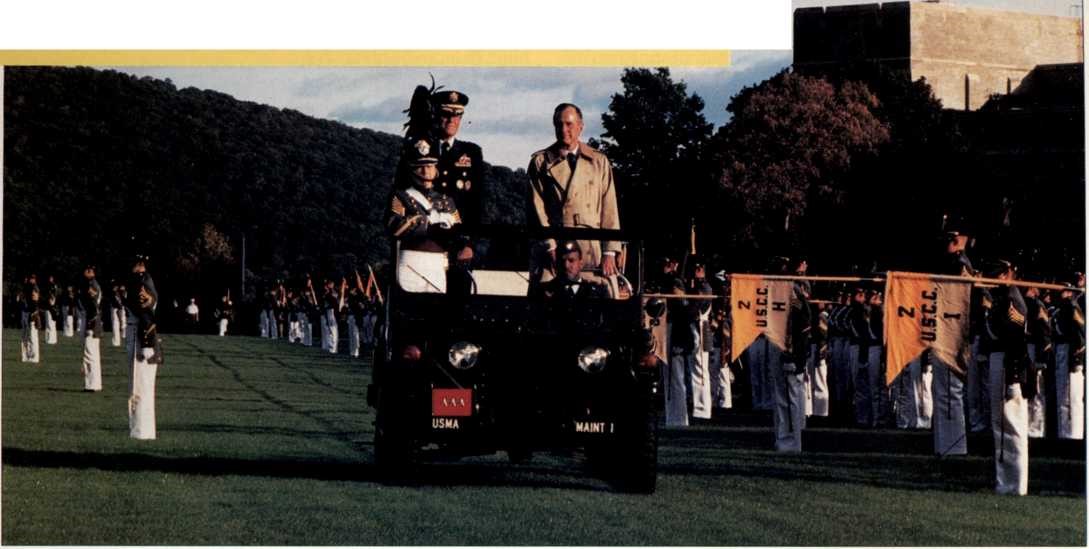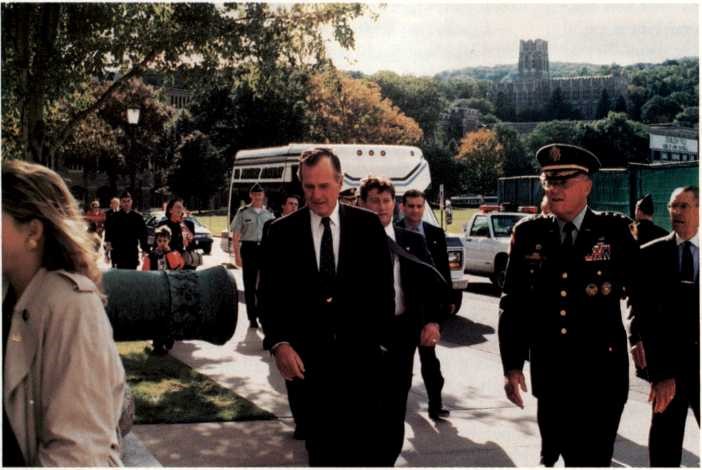1994 SYLVANUS THAYER AWARD
GEORGE BUSH Article
 Assembly 1995 Jan. - On Wednesday, 5 October 1994, a day as festive as it was blustery, the Association of Graduates, the United States Military Academy, and the Corps of Cadets welcomed former President George Bush to West Point and bestowed on him the 37th annual Sylvanus Thayer Medal, the Academy’s most prestigious award. It was President Bush’s fifth official visit to West Point and the third time the award has been given to a former President. (Mr. Bush follows Dwight D. Eisenhower in 1961 and Ronald Reagan in 1989).
Assembly 1995 Jan. - On Wednesday, 5 October 1994, a day as festive as it was blustery, the Association of Graduates, the United States Military Academy, and the Corps of Cadets welcomed former President George Bush to West Point and bestowed on him the 37th annual Sylvanus Thayer Medal, the Academy’s most prestigious award. It was President Bush’s fifth official visit to West Point and the third time the award has been given to a former President. (Mr. Bush follows Dwight D. Eisenhower in 1961 and Ronald Reagan in 1989).
The award is conferred annually upon an outstanding citizen “whose record of service to their country, accomplishments in the national interest, and manner of achievement exemplify outstanding devotion to the principles expressed in the motto of the United States Military Acad-emy—Duty, Honor, Country.” It is named in honor of Sylvanus Thayer, USMA Class of 1808, the 33d graduate of West Point and its fifth superintendent (1817-1833). Previous awardees have included Douglas MacArthur ’03, Francis Cardinal Spellman, Neil A. Armstrong, Warren E. Burger, and George P. Shultz.
A Reception, a Parade (but no Saber)
President Bush arrived by helicopter at 1430 hours unaccompanied by his wife Barbara (to the mild disappointment of many) the guest of the Superintendent, Lieutenant General Howard D. Graves ’61, and his wife Gracie. Mr. Bush first paid a visit to the Superintendent at his office, then received an official reception at Cullum Hall, where he was greeted by distinguished guests of the Association of Graduates and by prominent members of the greater West Point community.
Just before 1700 hours, following the reception, the former President was escorted to the parade field to be honored with a double regimental review and the presentation of a memento, a fine porcelain statuette of a cadet at attention. The customary gift, a cadet saber, was not given because President Bush received one in 1984, when, as Vice President, he delivered the commencement address. An hour later, President Bush, his party, the Corps of Cadets and numerous guests repaired to Washington Hall for the evening banquet and Thayer Award Ceremony. Among the attendees were BG Freddy McFerrin ’66, Commandant of Cadets, and his wife Aubrey; BG Gerald E. Galloway ’57, Dean of the Academic Board; Mr. John A. Hammack ’49, Vice Chairman of the Association of Graduates, and his wife Gloria; COL (Retired) Seth Hudgins ’64, President of the AOG, and his wife Joy; Mr. Denis Mullane ’52, former President of the AOG, attending with his family; GEN (Ret) Brent Scowcroft ’47, former National Security Advisor; and LTG (Ret) Dave R. Palmer ’56, former Superintendent.
Prior to the reading of the citation and conferring of the award, the former President was introduced by the Superintendent and the Vice Chairman of the AOG, Mr. Hammack. General Graves noted the timeless significance of Colonel Thayer’s insistence on character as an essential element of leadership, and Mr.Hammack lauded the decision of the Selection Committee—made up of a dozen graduates from the Class of January 1943 to the Class of 1980—to nominate George Bush for the award. The citation, written by General (Ret) Edward C. Meyer ’51, Chairman of the AOG, was then read. It touched upon Mr. Bush’s accomplishments as a naval aviator, congressman, ambassador, Director of Central Intelligence, vice president, and, finally, the nation’s 41st President, devoting special praise to President Bush’s leadership in the Gulf War. This leadership, the citation declared, was “a standard for his successors to emulate” and the culmination of “a matchless record of achievement.” After the citation the medal was presented and President Bush began his remarks.
An Unexpected Visit, a Delighted Class
At the end of the evening the former President retired to Quarters 100 and a well-earned rest. The next day began early at the Supe’s, where—for the first time in recent years—the honored guest enjoyed breakfast with a small group of cadets. President Bush surprised his hosts by announcing his wish to visit a class that morning. Caught off guard but delighted, General Graves telephoned Colonel James Golden ’65, head of the Department of Social Sciences, and arrangements were hastily made. As Colonel Golden describes his morning: “The phone rang at 0815. The Superintendent was on the line. I congratulated him on a great ceremony the day before, and he told me that this morning would be even more interesting. President Bush’s departure had been delayed, and he wanted to see a Social Sciences class. They were about to leave Quarters 100 and would be at Lincoln Hall in five minutes. I was relieved to find a course on Legislative Politics in session and asked Major Clemson Turregano (Citadel ’83) if he had ever taught a President before. General Graves and President Bush arrived and the class quickly moved to a question and answer session. As usual, the cadets came through with flying colors. One asked, ‘Mr. President, if Congress had not approved the Gulf War resolution, what would you have done?’ We were off and running.”
Perhaps we should not have been so surprised. After all, President Bush had gone out of his way to seek out and talk with cadets throughout his visit and on his previous sojourns at the Academy. In addition to being one of the most impressive of Thayer awardees, George Bush proved himself one of the most personable.